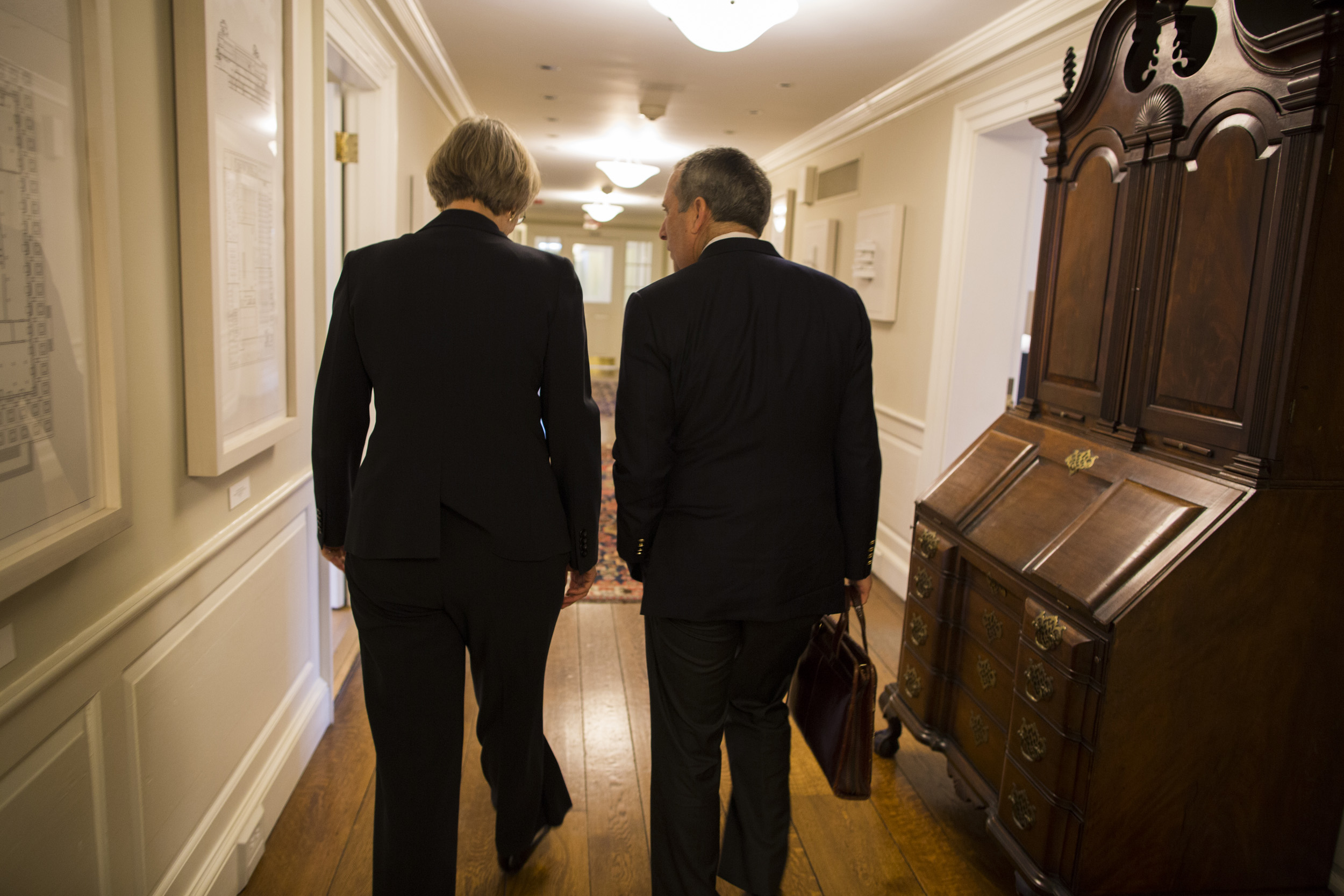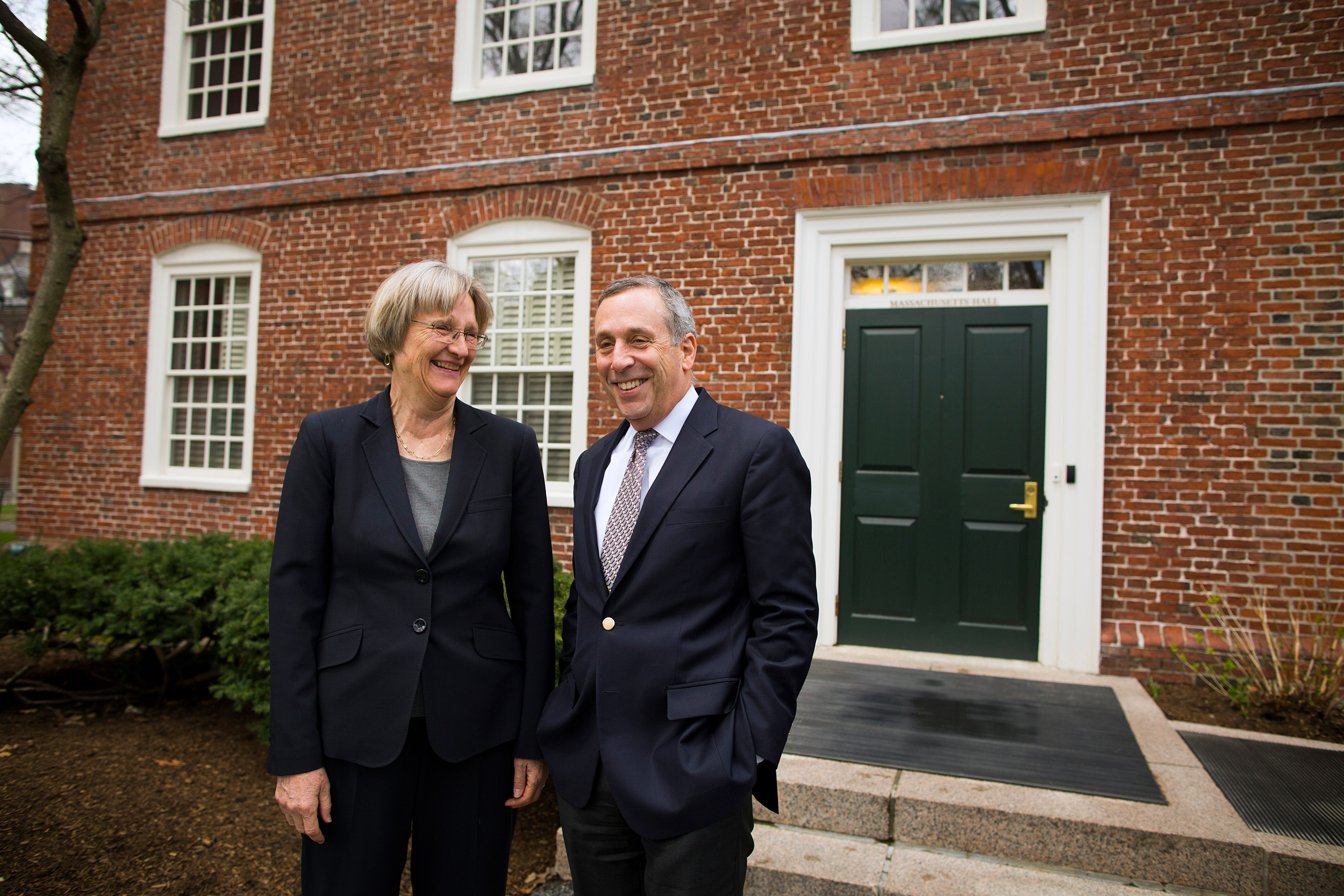
Harvard President Drew Faust (left) and Harvard President-elect Lawrence Bacow speak outside of Massachusetts Hall at Harvard University.
Photos by Stephanie Mitchell/Harvard Staff Photographer
Two leaders, one Harvard
Drew Faust and Larry Bacow on learning from each other, the value of humility in decision-making, and the biggest challenges facing higher education
Since their first meeting 10 years ago, Drew Faust and Larry Bacow have become invaluable sources of support and advice to each other, as well as good friends. The 28th Harvard president and the 29th sat down at Massachusetts Hall for a conversation that ranged from their childhoods in Virginia and Michigan, respectively, to the art of listening, to the role of colleges and universities in supporting the American dream.
Bacow, former chancellor at the Massachusetts Institute of Technology and president of Tufts University from 2001 to 2011, is a lawyer and economist by training whose research focuses on environmental policy. He will succeed Faust on July 1.
GAZETTE: Can you tell me how you met?
FAUST: When I was named president in 2007, Larry was president of Tufts, and he called up and invited Charles and me to dinner the first night of my presidency. So on July 1, 2007, Charles and I went to the president’s house. [Charles Rosenberg is President Faust’s husband.]
Larry and Adele cooked dinner for us. [Bacow is married to Adele Fleet Bacow.] So that was a lovely beginning. And there is a kind of addendum to this. About a year, a year and a half ago, when I confided to Larry that I was going to be stepping down, we made a date to have dinner on the first night of my non-presidency, which turns out to be the first night of his presidency, which I think neither one of us had anticipated at the moment we set the date.
BACOW: Absolutely.
FAUST: So on July 1, 2018, we will be having dinner, and by all fairness I ought to cook, but I don’t think I am going to have a kitchen, a place to live.
GAZETTE: Where will it be?
BACOW: It’s going to be at our place.
FAUST: The first day after you step down, I will cook for you. There’s a new date.
BACOW: There you go.
FAUST: Just to build on this, after we met, Larry was hugely helpful to me as a new president, especially after the financial crisis, when we were both facing things that neither one of us had ever faced before. We did a kind of home-and-home arrangement, where I’d go to Tufts to the president’s house, or he would come to Elmwood.
BACOW: We’d open up a nice bottle of something, we’d put a significant dent in it, and we’d commiserate.
FAUST: And the financial crisis looked so much better after those conversations.
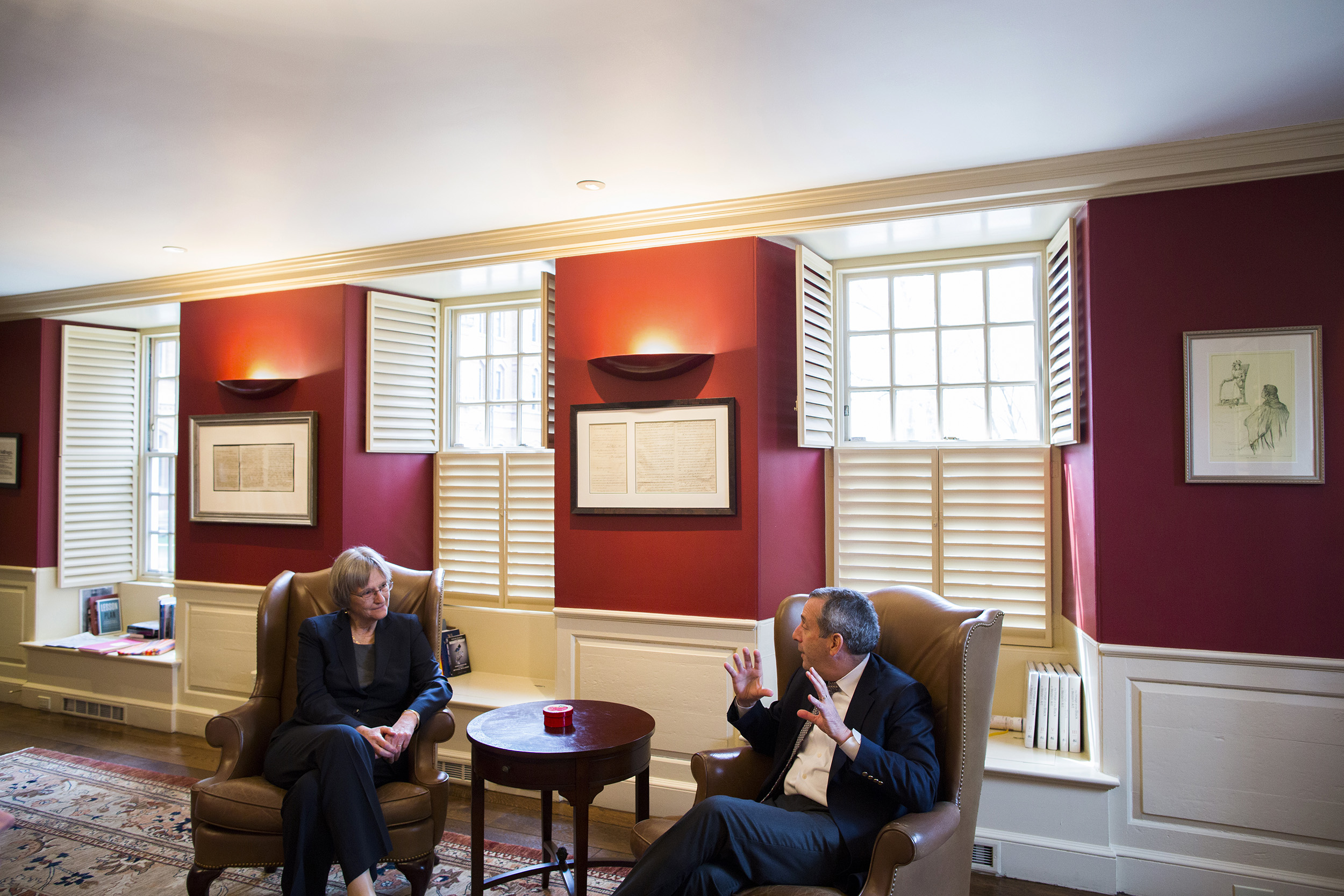
BACOW: When I announced that I was leaving Tufts, I was invited to join the Harvard Corporation, and then we just kept seeing each other. A number of people have asked me about the transition and I keep telling them that this transition is actually much easier than the transition to Tufts because I know the place better. It knows me as well. I think for the last seven years, once a month you and I have had breakfast or lunch and once a month [Provost] Alan [Garber] and I have had breakfast or lunch, which means, since those are often staggered, about every other week I’ve had breakfast or lunch with one of you. To say nothing of all the other meals I have eaten in service to Harvard. So we’ve really gotten to know each other quite well.
GAZETTE: What are the most important things you have learned from each other during your respective 10 years leading Harvard and Tufts?
FAUST: I remember one of our meetings in the living room at the president’s house at Tufts in the middle of the financial crisis, you shared with me a statement that you had delivered to the Tufts community. I remember thinking, “This is so admirably straightforward. So open about what’s going on, so direct.” I think Larry’s directness during that time was an inspiration to me and reinforcing of instincts that I might have had but may not have dared to act on quite so directly. So that was a big influence.
BACOW: Thank you. I’ve learned a lot from Drew over the last seven years about Harvard. Drew has managed with incredible grace to bring Harvard together. We talk about “One Harvard,” but it’s the way in which she has engaged people that I will try to emulate. She’s been a wonderful listener, which is important for any president. But she’s also been a forceful advocate internally for a set of principles and values. You have been very consistent in your messages, and I think that that’s how you get things done, especially in a place that’s as large and decentralized as this one. So there are many things that I will try to emulate, but I can only hope to come close to Drew’s style and grace.
GAZETTE: Will you continue to connect with each other for advice and suggestions?
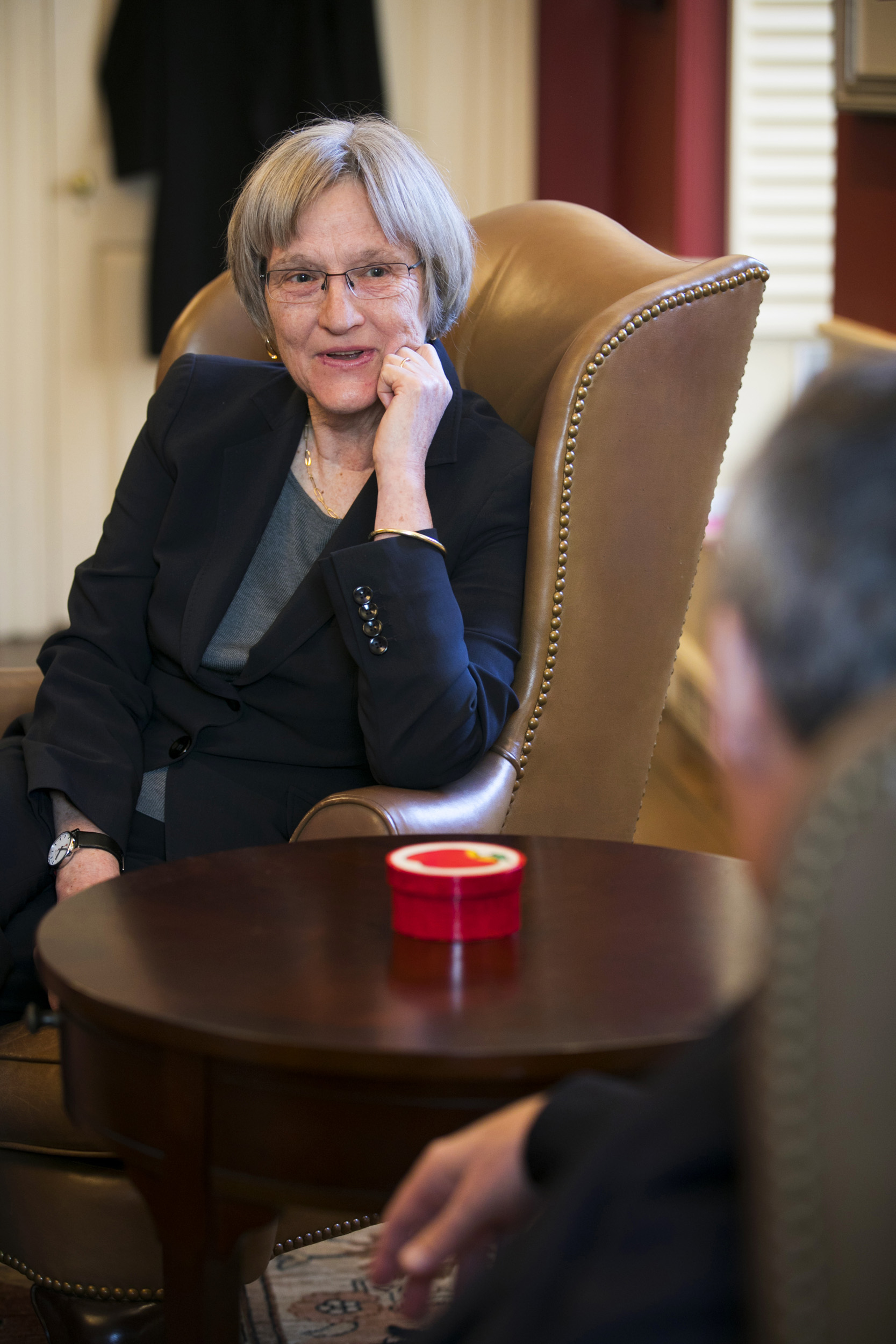
BACOW: Oh, yeah. I kid Drew that I’ve added up all the phone calls and the meals together when she has been asking me for advice. So I have this big account surplus which I intend to spend down now. Drew will be on speed dial, trust me. And of course, I will be channeling her at times as well.
FAUST: At his request, I will do whatever he asks. I was touched because Katie Tiger, who does my schedule, said, “Larry’s called up and he wants to schedule time with you,” and I thought, Well, I’m not going to be president anymore. She said, “He wants to connect the way you did, once a month.”
BACOW: Exactly, once a month. If Charles will allow. Both of our spouses have sort of suffered through these periods where they have had to share us with the rest of the world: Right? And now Charles gets you back, and not just Charles, but your daughter and your friends.
GAZETTE: Can you both speak a little bit more about how you balance these public-facing roles with your private lives?
BACOW: I think Adele and I have had an advantage, at least relative to many college and university presidents, because we’ve lived in Boston since we came here as freshmen in 1969. And so we have all of these wonderful friends who have known us forever as Adele and Larry. I think when people move to a new city and they show up in these roles, it’s really, really hard to make the kind of friendships that permit you to be unguarded, open, where you share some of your personal frustrations at times with people where it’s safe to do so. And so we are blessed with these friends, and they will still be our friends now that we moved into these new roles. So that’s helped us to preserve a sense of private time.
Our children are very important to us. They live in New York City. We have two sons, both married with families of their own. Drew tells me that she’s actually spent a little bit of time in New York during her tenure as president of Harvard, so I am assuming I will have plenty of opportunities to get there as well. But finding time for family and friends is hard. You make a lot of sacrifices in these jobs.
FAUST: How old was your youngest son when you started as chancellor at MIT?
BACOW: It was Jay’s freshman year in college, so Kenny was a junior in high school.
FAUST: So they were pretty far along before you really took on big administrative responsibilities.
BACOW: They were. But Adele and Kenny actually did an intervention at one point with me. As chancellor I was going into the office every weekend and they finally had to sit me down to say, “Something has to change.” I went in to talk to [then-MIT President] Chuck Vest the next day, and said, “I am willing to sacrifice a lot for MIT and for this job, but not my family.” And he said: “Absolutely right.” So I restructured things.
It’s interesting, when I moved into the presidency in some ways I found it easier to manage my schedule than when I was chancellor at MIT.
FAUST: Because you were in charge?
BACOW: Because I was in charge. You control your own schedule to a much greater degree as president.
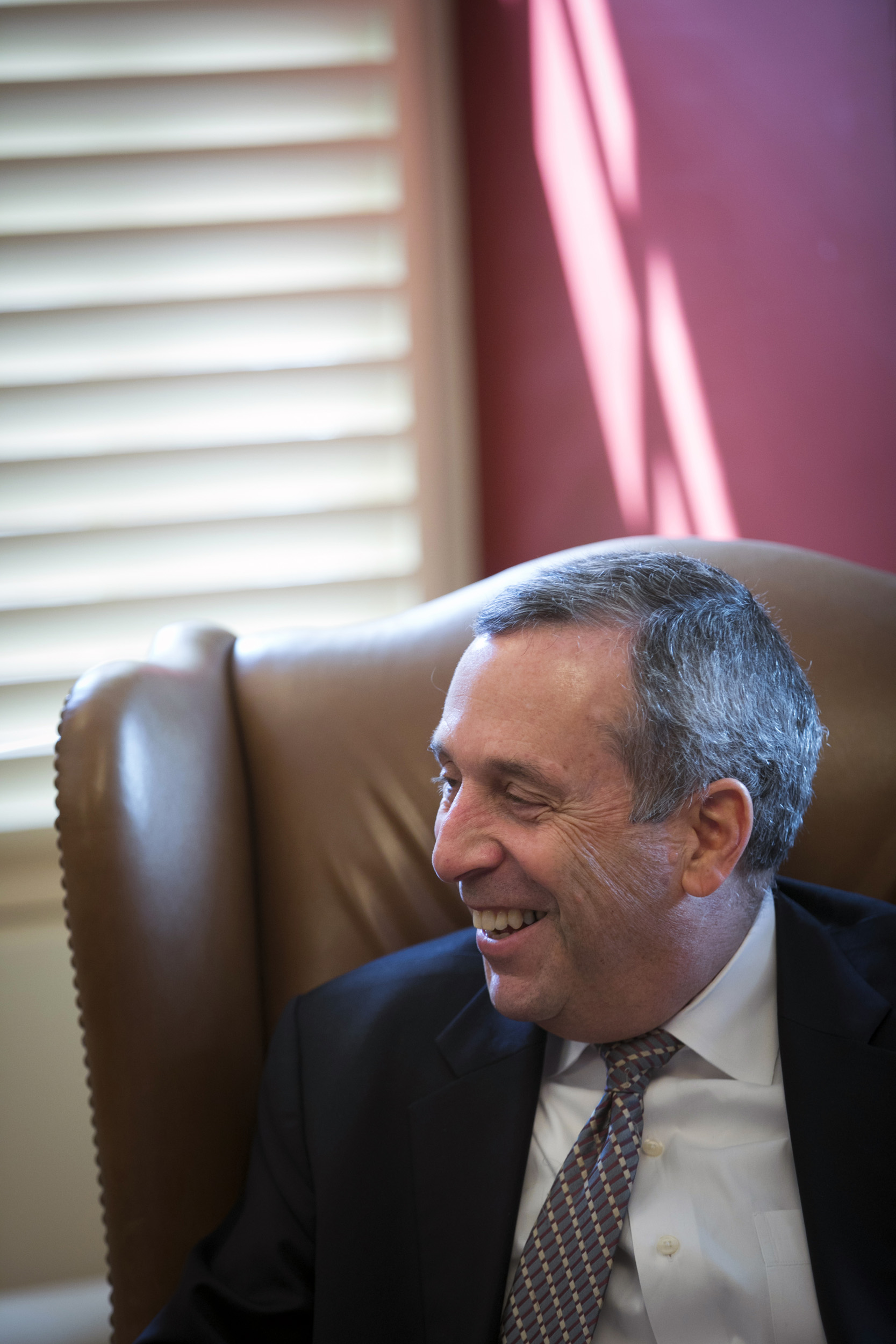
FAUST: The advice I would give to any new dean or anybody taking on a big position is: “You are the only person who has your interests at heart in terms of time management. Everyone else is going to try to get you to do stuff, so take control of it.”
GAZETTE: I wanted to ask both of you about people you have sought out for advice.
FAUST: Oh, my gosh, there are lists and lists and lists.
GAZETTE: Anyone who comes to the top?
FAUST: Members of our governing board. Different people at different times. Bill Lee has been a wonderful mentor to me from the moment we first met each other at a dinner during the presidential search. A person of such good judgment, and calm in the face of whatever is going on, with a deep understanding of Harvard. He has been terrific. But I am a big advice-seeker. I talk to anybody I can find that I think might have a perspective. I talk to alums when I am on a development visit, and if someone has great accomplishments in running an organization or thinking about financial questions, I just seek their advice on whatever issues are troubling me at the moment.
BACOW: In addition to Drew, when I was at Tufts there were a couple of other presidents I always turned to. One was Chuck Vest, another was Bill Bowen, former president of Princeton and the Mellon Foundation, another one was Jim Freedman, the former president of Dartmouth. With certain things I think it’s helpful to talk to people who have sat in the same chair, if not at the same institution.
And then we have these wonderful friends who we go way back with. We had a dinner party the first or second year that we were married — this is over 40 years ago. We invited three couples that did not know each other at the time. And the eight of us, joined by one other couple — newbies because they joined 17 years ago — have been getting together for dinner ever since. We’ve grown up together. A couple of us are academics, one is a federal judge, one ran another huge organization. So there’s a lot of life experience there. I can’t think of an issue where I couldn’t learn from people in that group.
GAZETTE: Could you both weigh in on what you see as the greatest challenge facing higher education today in the U.S.?
FAUST: I would say skepticism about the value of higher education, and skepticism about higher education’s product: facts, science, knowledge, an educated citizenry that is not just narrowly trained but broadly educated. We have to make a case for all of those things, and a lot of our other challenges derive from the reality that I just described.
BACOW: I would agree. I think as the real cost of higher education has increased people have adopted more of a consumerist or instrumental approach to higher education. What does it do for me? What’s the return on it in the very narrow, short term? There’s a proposal to evaluate colleges and universities based on the incomes of their graduates after their first job. By that metric, Drew, both you and I would have been considered failures coming out of our alma maters.
FAUST: Yep.
“One of the things which I learned during my time at Tufts is that a university presidency is a marathon, it’s not a sprint. And having run the Boston Marathon multiple times, I can tell you that one of the big mistakes that new marathon runners make is that they try to go out too fast. And so I anticipate spending a fair amount of this first year listening, learning.”
Larry Bacow
BACOW: Because we each took a first job that paid a pittance relative to some other jobs. So I think that the current narrative about higher education in the U.S. is one that we have to work really hard to change. As Drew says, people are questioning the value of a diploma. They are questioning the value of these institutions to society. They are questioning whether or not colleges and universities actually contribute to the American dream. That’s scary. We need to change that conversation.
GAZETTE: As the incoming president of Harvard, what do you see as your greatest challenge in your first year?
BACOW: One of the things which I learned during my time at Tufts is that a university presidency is a marathon, it’s not a sprint. And having run the Boston Marathon multiple times, I can tell you that one of the big mistakes that new marathon runners make is that they try to go out too fast. And so I anticipate spending a fair amount of this first year listening, learning. I know a lot about this institution from my time on the Corporation, but that’s nothing close to what I need to know in order to do this job effectively. I would say my biggest challenge is going to be getting to know Harvard really, really well, so that I can be an informed leader and make the kinds of judgments which Drew probably makes like that [snaps fingers].
GAZETTE: Is there something outside of your personal lives, something that has had a big influence on the way you have run things? Anything outside of your professional lives that you have been able to bring into your careers?
FAUST: Well, I get asked about this, and the more I am asked about it and the more I answer, the more I am convinced it is true, which is how history has influenced me — how it’s influenced my approach to thinking about this job. I’ve said often that leadership is about change. It’s about people resisting change or embracing change, it’s about bringing an organization through change. But I’ve been thinking recently about how the way I’ve always done history is to listen; to listen to voices from the past to try to figure out how they are seeing the world. And for me that’s how I ended up writing about death. Prior to “This Republic of Suffering,” I wrote a book about Confederate women, and what they were writing about all the time was death. So it was really reading their letters and listening to their voices that made me understand what I needed to say and do and what was important.
I think that kind of training in historical listening has been an important part of it, the essence of listening as a leader, which, I think both of us agree, is seminal to how to get the work done.
BACOW: It’s interesting how our scholarly backgrounds influence how we see the world and how we do our jobs. I spent a fair amount of time in my career doing research and thinking about bargaining and negotiation and dispute resolution. If you want to try to move a group you need to understand the different interests and perspectives and be able to respond to them. And you need to be able to frame issues in ways so that people can imagine a future that’s different from the past, and can see how there’s a place for them in that future.
So, in the same way, Drew, that you probably look at life through the lens of history, I tend to look at life through a lens in which I am trying to understand how one can bring people to consensus, or at least how to create an unblocked coalition. In other words, you can’t always get everybody to agree on a path, but at least if you get enough people to agree it allows you to move forward. In that respect I think my scholarly background also plays a role in how I lead.
FAUST: Which came first? Did you become an economist because this was your perspective on the world, or is this the perspective you have because you are an economist? I wonder about that a lot. Was I attracted to history because I tended to see things this way? Or are both true?
BACOW: This is what in economics we would call an identification problem [laughs]. I’d have to spend a fair amount of time on somebody’s couch in order to figure that one out. But, you know, it’s also the case that while our disciplinary lenses can help us see and understand the world in ways that we might not otherwise see them, they can also be constricting. And it’s important to understand when to take the glasses off and see the world in different ways. There are times when I have to stop being an economist, and I assume you have to stop being a historian.
FAUST: That reminds me of a story about Larry Summers sitting in that chair and me sitting here for five years of his presidency while I was the Radcliffe dean. He talked about the world in a way that was so different from my take on the world, in that things were about numbers and things were about reducing complexity. Humanists always want to enhance complexity. I ended up writing a chapter in “This Republic of Suffering” that I don’t think I would have written had I not had those interactions. It’s a chapter about numbers, about counting the dead and what numbers came to mean and how thinking about numbers was a way to try to grapple with the ineffability of the tragedy. It was really sort of seeing, almost as an anthropologist, how Larry’s mind worked that made me able to see different things in my research.
GAZETTE: Can it be daunting, trying to grapple with a wealth of information and knowledge from different sources? Do you ever feel overwhelmed?
FAUST: It’s humbling.
BACOW: Yes, it is humbling. And you need to approach conversations with humility. I think that’s really important.
FAUST: A kind of respect for the craft and culture of the field that you are exploring.
BACOW: But at the same time we are also constantly being asked to make judgments about scholarship, about who is worthy of promotion, about who ought to be a dean, about taste, good judgment. And we are being asked to assess people in fields radically distant from our own as well. This is why approaching these decisions with humility is important.
GAZETTE: President Faust, you have spoken about how growing up in Virginia’s Shenandoah Valley had a strong impact on your choices and your love of history. Incoming President Bacow, I wonder if you could talk about your own background and if being the son of Jewish immigrants from Holocaust-era Europe may have affected the choices you made in your life?
BACOW: I think I’ve always felt a certain sense of responsibility to others. I said this when I was introduced to the Harvard community. I think my life in so many respects mirrors that of so many other people whose families came to this country in search of opportunity. This country has just been enormously good to me, and so a lot of what motivates me, a lot of the reasons I agreed to take this job, especially at this point in time for all the reasons we discussed earlier, is to ensure that others have access to the American dream just as I have. So in that respect, I do think it affects my view of the world. It affects how I see my role in the world, and for those of us who have been blessed to be able to study in places like this, to be able to work in places like this, I do think we bear a special responsibility to use the gifts that we’ve been given to try to make the world a better place.
GAZETTE: Did either of you have a sense of what you wanted to be when you were young? President Faust, I think you wanted to be a veterinarian?
FAUST: Yes, animals are very important to me and always have been. I grew up on a farm and I raised every animal you can imagine as a child. Horses, cattle, sheep, goats, chickens, dogs, cats.
BACOW: As a kid growing up I was really interested in science and math. I entered science fairs. I built Heathkits.
GAZETTE: Where did that interest come from?
BACOW: I loved numbers. I loved science. I read voraciously about science from the time I was really young. I actually ended up going to MIT because I kept reading about it in Popular Science and Scientific American. But I never actually thought I would be a scientist. I always thought I wanted to be a lawyer. It was only after I went to law school that I figured out I didn’t. I am not sorry I went to law school, but I realized I wasn’t cut out to practice law. I was enrolled in a joint degree program between Harvard Law School and Harvard Kennedy School and decided to complete the work for a Ph.D. from the Kennedy School, not intending to be an academic. I thought I was going to go work, with the start of the Carter administration, in Washington, D.C. Then I had an opportunity to fill in for somebody who was on leave from MIT for two years. A two-year, nontenured track. When I was contemplating whether or not to do it I went back to see my mentor at MIT, Bob Solow. He said, “You know, the government will be there when you are ready to go work for it.” So I took the job at MIT and two years turned into 24. And I am still at it on some level.
GAZETTE: I noticed an interesting parallel in your childhoods. President Faust, you were in the 4-H Club and the Brownies, while incoming President Bacow was a Boy Scout who eventually made it to Eagle Scout. Were these formative experiences?
FAUST: 4-H was very important to me. I loved the responsibility of taking care of this steer and learning all about animal husbandry, and the county agent would stop by to see how I was doing. So it was a lot of fun.
BACOW: I learned a lot in Boy Scouts. One of the things which I learned is that I enjoy teaching. I went to Boy Scout camp one summer — you would only go for a week — and at the end of the week they realized that the person who was supposed to teach the next cooking merit badge session wasn’t going to show up, so they needed somebody to do that.
FAUST: So you have a cooking merit badge?
BACOW: Oh, I do. Not only that but I taught cooking merit badge.
FAUST: Wow, I should have recognized that when I had that delicious dinner back in 2007.
BACOW: In fact, the final project for each of my students was that they had to bake a pie in a Dutch oven over an open flame. It was the first time I ever had an opportunity to teach, and I realized I enjoyed teaching. That’s where the seed was planted. But I also learned a lot of other useful life skills.
GAZETTE: I wonder how being a professor has helped inform leadership for each of you?
FAUST: It was absolutely defining in that it gives you a perspective on the university from one of the most, if not the most, important elements of the university — the faculty. They are the ones who live through an era at a university, and have so much responsibility and power in university governance, and embody the intellectual mission of the place. So understanding that culture and those values was very important. On a more instrumental level I think that teaching large classes, lecturing, answering questions, having to explain things to people, was an invaluable preparation for the kind of work a president does. It’s about learning how to communicate and explaining things to people that they might not understand initially or that they might not know about, and responding to their queries about issues. Those are all things that are very much a part of my life every day.
BACOW: I avoided academic administration for 21 of my 24 years as a faculty member.
FAUST: You know both of us did that. We are both really late starters.
BACOW: I loved the life of a faculty member. Why screw it up? It was a wonderful life. When I moved into administration, when I became chancellor at MIT, I found that there was an interesting opportunity to fix things that bothered me as a faculty member and it was very gratifying to be able to do that. Now what I say all the time, because I believe it, and I know Drew does as well, is the job of an administration, our job, is to enable faculty to do their best work, their best teaching, their best scholarship. And I think if you haven’t done it yourself, you don’t know what that is. And so I think we do what we do because we believe in the work of the faculty. If we didn’t, then I think we would be miscast in these roles.
FAUST: Well put.
“I worry sometimes that we don’t take enough joy in what the work of this place is. It’s very serious work and it’s work that has enormous relevance and impact, and changes lives, as you were describing. But it’s also so miraculous to be here with people learning and discovering and to be sharing that with them.”
Drew Faust
GAZETTE: What’s the hardest part about being a university president?
BACOW: The hardest part is keeping your waistline under control [laughter]. I used to joke when I was at Tufts that my real title was not president, it was university stomach. But I ate in service to the institution.
FAUST: Yes, eating for Harvard.
BACOW: Don’t you find it that way?
FAUST: Oh, yes.
BACOW: So that was one of the hardest things.
FAUST: I think the hardest part is just having to be steady and always know that how you react to a situation is going to affect so many people around you. In a moment of difficulty or crisis or whatever it might be, you need to be a symbol of the institution. The responsibility is wonderful in many ways because it comes with the ability to do things and to fix things and to change things and accomplish things. But it is also in itself a huge responsibility.
BACOW: One piece of advice I give to every new university president I speak to is to always do the right thing. It’s usually not that difficult to figure out; it’s often excruciatingly difficult to do. And being able to constantly focus on what’s the right thing for the institution long-term. Watching how others have maintained their balance through difficult times can be very instructive and very reassuring. These jobs are not for the faint of heart.
GAZETTE: President Faust, is there one piece of advice you would offer your friend as he steps into this role?
FAUST: Make sure you do things that just give you joy. There is so much around this campus. In the myriad of choices and obligations that people will present to you, make sure you put lots of them in there that you enjoy. Because there is much joy to be had, and I worry sometimes that we don’t take enough joy in what the work of this place is. It’s very serious work and it’s work that has enormous relevance and impact, and changes lives, as you were describing. But it’s also so miraculous to be here with people learning and discovering and to be sharing that with them. So celebrate that.
BACOW: I will.
GAZETTE: Thank you both so much for taking the time.
FAUST: Of course.
BACOW: This was fun.
GAZETTE: My last question, for incoming President Bacow: Red Sox or Detroit Tigers?
BACOW: Red Sox, Bruins, Celtics, Patriots.
